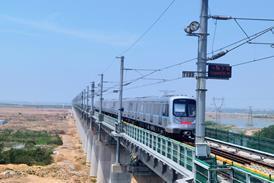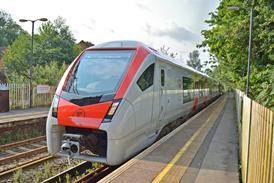EFFICIENT management of passenger services today is a delicate balance between increasing ridership and yield, controlling costs and maintaining quality standards. Critical issues include managing passenger loadings at peak periods, and increasing the yield from the fares structure.
In Britain, AEA Technology Rail has developed software models to address these two issues. Merlin, developed with Great Western Trains, assists Train Operating Companies in building a fares and timetable strategy. As with the airlines, the principle is that each seat is sold at the highest possible price. This means segmenting the market, and has led to a wide range of ticket types.
For example, passengers wishing to travel from London to Bristol around 17·00 have a choice of five different fares valid on Great Western services from Paddington, depending on how flexible they are prepared to be about the time they travel, plus an extra two if they are prepared for a longer journey using the Wales & West service from Waterloo (Table I). In addition, there is the further complication of fare validities for the return journey.
By taking into account how passengers weigh up fare levels, journey times, ticket restrictions, comfort of rolling stock and so on, Merlin predicts the number of passengers choosing each train/ticket combination, or deciding not to travel. With this it can predict loadings and revenues for each service.
Merlin allows train operators to address strategic and tactical questions, such as the introduction of new ticket types and the setting of quotas, or the deployment of rolling stock. It can help determine the most cost effective way to relieve overcrowding, either by adding an extra service or offering cheap off-peak tickets to try and divert the excess traffic.
Managing peak overcrowding is the main function of the second package. Plato was developed to help the commuter-oriented TOCs match supply and demand, demonstrate their timetables’ ability to meet regulatory load factors, and maximise the efficient use of rolling stock.
Plato concentrates on season ticket holders, and the peak 3 h in the morning and evening. It models in more detail the factors which are important to commuters - employment location and access times from different stations, times of starting and finishing work, and the effects of overcrowding on train choice.
For any proposed timetable, Plato predicts the loading on each train, and establishes how far the timetable meets customer aspirations and regulatory requirements. The software is being used by several London commuter TOCs to plan and test new timetables, and has been approved for this by the Office of Passenger Rail Franchising. Plato can also be combined with AEA Technology Rail’s Passenger Load Determination Software, which measures the numbers of passengers on current services by weighing the train.
AEA Technology Rail
Reader Enquiry Form 101
TABLE: Table I. London - Bristol evening peak departures
Operator Great Great Great Great Great Great Wales &
Western Western Western Western Western Western West
Depart 15.45 16.15 16.45 17.15 18.45 19.15 19.17
Arrive 17.25 17.55 18.23 18.52 20.28 20.55 21.46
Journey time min 100 100 98 97 103 100 149
Walk-on Super- Saver Open Open Saver Super- Super-
return fare saver saver saver
£29·00 £36·10 £63·00 £63·00 £36·10 £29·00 £25·30
Advance purchase Apex Super Super Super Super Apex Apex
return fare Advance Advance Advance Advance
(subject to quota) £18·50 £25·00 £25·00 £25·00 £25·00 £18·50 £15·00
CAPTION: Great Western 200 km/h HSTs wait to leave Paddington for Bristol, South Wales and the West of England




















